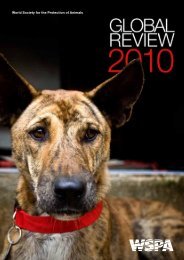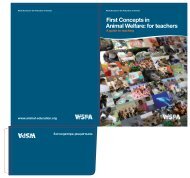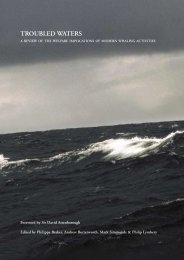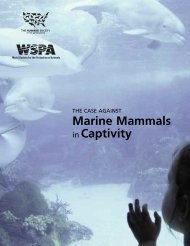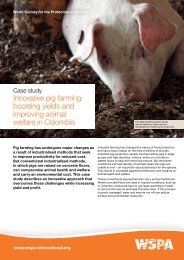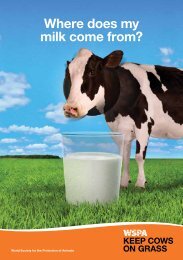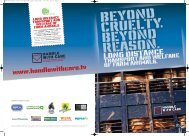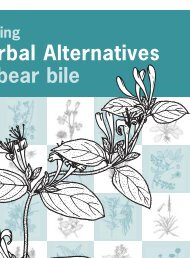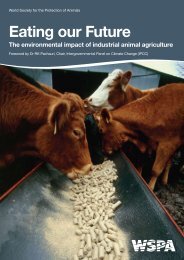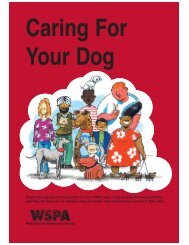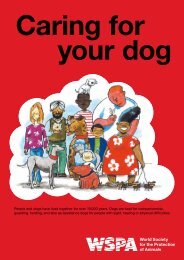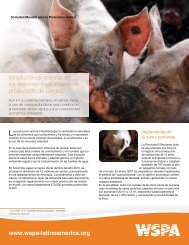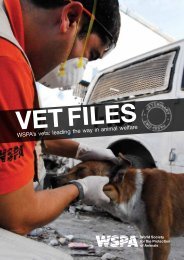Proceedings of the Untangled symposium: - WSPA
Proceedings of the Untangled symposium: - WSPA
Proceedings of the Untangled symposium: - WSPA
You also want an ePaper? Increase the reach of your titles
YUMPU automatically turns print PDFs into web optimized ePapers that Google loves.
Annex 4Submitted abstracts accompanyingposter presentationsAbstracts are presented under <strong>the</strong> <strong>the</strong>mes <strong>of</strong> reduce,remove, and rescue.Please note: all abstracts in Annex 4 are <strong>the</strong> intellectualproperty <strong>of</strong> <strong>the</strong> author and are presented here assubmitted. This annex does not contain content by<strong>WSPA</strong>; please contact individual authors for fur<strong>the</strong>rinformation or requests to quote.ReduceThe following abstracts are those submitted under <strong>the</strong><strong>the</strong>me <strong>of</strong> reducing <strong>the</strong> amount <strong>of</strong> marine litter entering<strong>the</strong> oceans and harming animals.Regional cooperation and intergovernmentalagreements: key elements addressing marine debrisissues in <strong>the</strong> Wider Caribbean RegionAlessandra Vanzella-KhouriUnited Nations Environment Programme –Caribbean Environment Programme (UNEP-CEP)14-20 Port Royal Street, Kingston, Jamaicaavk@cep.unep.orgThe Convention for <strong>the</strong> Protection and Development <strong>of</strong><strong>the</strong> Marine Environment <strong>of</strong> <strong>the</strong> Wider Caribbean Region(Cartagena Convention, 1983) and its Protocols are <strong>the</strong>only legally binding environmental treaties for <strong>the</strong> WiderCaribbean Region and constitute a legal commitment by<strong>the</strong> participating governments to protect, develop andmanage <strong>the</strong>ir marine resources individually or jointly.Through <strong>the</strong> Protocol Concerning Specially ProtectedAreas and Wildlife (SPAW Protocol, 1990), coastal andmarine biodiversity issues are managed through anecosystem-based and integrated precautionary approachand supported through a comprehensive programme.Through <strong>the</strong> Protocol Concerning Land-based Pollutionand Activities (LBS Protocol, 1999), both point andnon-point sources <strong>of</strong> pollution, including marine debris,are addressed through an integrated environmentalprogramme, which also interacts with <strong>the</strong> GlobalProgramme <strong>of</strong> Action (GPA) on land-based pollution.The SPAW Protocol grants total protection to hundreds<strong>of</strong> species, including all species <strong>of</strong> sea turtles and marinemammals that inhabit <strong>the</strong> Wider Caribbeanand which are being affected by marine debris.A marine mammal Action Plan developed under SPAWhighlights entanglements and fisheries interactions asmajor threats to marine mammals. In this context, <strong>the</strong>UNEP administered Cartagena Convention and SPAWand LBS Protocols promote and facilitate regionalcooperation to address <strong>the</strong>se issues within a holisticframework developed and executed in partnership withgovernments, o<strong>the</strong>r UN agencies and initiatives, NGOs,<strong>the</strong> scientific community, <strong>the</strong> private sector and donorsand which supports assessments, capacity building,and management interventions.Private sector efforts to create effective,collaborative partnerships to reduce litterAshley Carlson, ConsultantAmerican Chemistry Council115 Chase Rd, Londonderry, NH 03053, USAAshley@ashleycarlsonconsulting.comOver <strong>the</strong> years numerous programs and approacheshave been developed by government agencies,industry groups and NGOs to increase public awarenessregarding marine debris, and to establish litter abatementand o<strong>the</strong>r programs to change behaviors that ultimatelylead to marine debris impacting coastal areas and<strong>the</strong> ocean.As producers <strong>of</strong> materials that have found <strong>the</strong>ir wayinto <strong>the</strong> marine environment, plastic makers are activelyinvolved in marine debris and litter prevention programsand are working with governments, scientists, retailers,anti-litter groups and consumers to devise solutions tohelp prevent marine debris.This presentation will highlight examples <strong>of</strong> severalsuccessful programs through <strong>the</strong> Declaration <strong>of</strong>Global Plastics Associations for Solutions on MarineLitter. With over 50 plastics organizations from30 countries signed on to <strong>the</strong> Declaration, thispresentation will explore global projects and partnershipsthat work to help reduce plastic from entering ourenvironment, such as <strong>the</strong> American Chemistry Council’spartnership to place nearly 700 recycling bins andeducational signage in 19 communities along <strong>the</strong>California coast; and a global industry stewardship30



